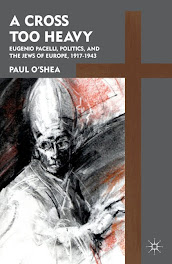ADSS 1.60 Valerio Valeri, France to Luigi Maglione, Sec
State.
Reference:
Report 8415/179, (AES 3754/39)
Location
and date: Paris, 10.06.1939
Summary
statement: The idea of calling a meeting of the International Diplomatic Academy
to study the conditions of peace has been proposed and the encouragement of the
HS sought. Valeri explained HS
difficulties with its participation.
Language:
Italian
Text:
A
few days ago, M. de la Barra, ex-President of Mexico, and M. Frangulis, Manager
of the International Diplomatic Academy, both well known to your Eminence came
to see me. The purpose of the visit was
to inform me about a project of theirs and to ask for the support of the Holy
See. (1)
In
consideration of the fact that the League of Nations – said M. Frangulis – has
lost almost all its influence on international affairs, especially on account
of the withdrawal from it of several important States, he and M. del la Barra,
in agreement with other personalities in the political and diplomatic world,
had in mind to invite all the members of the International Diplomatic Academy
to a Conference, or rather to a meeting, without any discrimination, to
discuss, in an atmosphere of mutual understanding, all the outstanding issues
endangering the peace between peoples.
This meeting should not have any official character, nor would it
presume to solve the problems in the practical field, but would confine itself
to create contacts and facilitate an exchange of opinions between person who, being
citizens of nations now standing in opposite camps, would not otherwise have
the opportunity to meet, to know each other and discuss matters of
interest. Such meetings would be held in
Paris, or to allay understandable mistrust, in Switzerland or Luxembourg.
In order to ensure a wider success to this project, M. de la Barra and M.
Frangulis solicited, by visiting me, the approval, the encouragement and, if
possible the participation to their initiative of the Holy See, who is so eager
to maintain peace in the world.
At
this point I observed that the Holy See, while it cannot but praise and approve
all sincere endeavours to improve relations amongst nations, could not take up
a position which would bind it, even indirectly, and compromise its moderating
action which, while it remains independent, is all the more effective. In fact – I added – even recent events show
how delicate the Holy See’s position is in the field of international issues,
where it is so difficult to put forward a proposal which could be easily
misunderstood and distorted.
I
promised M. de la Barra and M. Frangulis anyway that I would report this
interview to your Eminence, as they had asked me, and submit their praiseworthy
intentions to your enlightened judgement.
I point out to them at the same time that if they wanted to reach some
results it was necessary that the proposed meeting should keep to the utmost
impartiality towards the representatives of the various contrasting tendencies
in order not to give the impression that it was a French affair.
To
tell the truth I wouldn’t be surprised if this initiative was mixed with a
little vanity on the part of the promoters, both for the wish of gaining fame
in the diplomatic and political field, and to bring more importance to the Academy
which they direct.
I
think that if the project gains hold – something very problematical at present
as they first wish to know indirectly through M. Béranger, what the French
Government think if it – the Holy See could perhaps limit itself to expressing
its approval in a general way by praising everything done for peace. (2) But
your Eminence will decide.
Notes:
(1)
Francisco de la Barra (1863-1939) interim President of Mexico 1911, highly
regarded expert in international law; Antoine Frangulis (1888-1975), Greek
jurist and diplomat, Greek representative at the League of Nations 1920-22,
co-founder of the International Diplomatic Academy. Frangulis was one of the first lawyers to
specialise in human rights in the 1920s, his work contributed to the process
that led to the Declaration of Human Rights in 1947. The International
Diplomatic Academy, founded in Paris in 1926, was one of the first
organisations dedicated to the study of international relations.
(2)
Henry Béranger (1867-1952), French senator 1912-45, French delegate to the
League of Nations 1932, French delegate at the Evian Conference 1938. He was a
known anti-Fascist.




No comments:
Post a Comment
You are welcome to post a comment. Please be respectful and address the issues, not the person. Comments are subject to moderation.